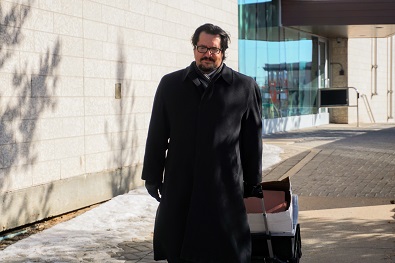Crown prosecutor Jeff Lubyk leaves court after the hearing on March 21, 2017. Photo by Chelsea Laskowski.
Leslie Black addressed court soon after evidence closed in his Prince Albert dangerous offender hearing on Tuesday.
His attempted murder victim, Marlene Bird, was not present when Black, 31, addressed court, reading from a statement he prepared with his lawyer earlier in the morning in an effort to limit his pronounced stutter.
Black spoke fairly clearly and with an even tone, saying if he could relive the day he tried to kill Bird, he would do it differently. He said he should have listened to his dad, who asked him to stay home that night.
“I understand if the other person cannot forgive me,” he said, because he cannot forgive himself.
He described himself as a normally “happy go lucky” kind of guy, and said he’s ready to accept whatever sentence he gets and put in the work so that he can eventually reintegrate into society.
Closing arguments in the hearing are expected to be heard in June, and a sentence delivered after that.
Black’s comment came after four full days of testimony from a psychiatrist, correctional workers, and psychologist who spoke about treatment options and about Black’s risk to reoffend after attempting to murder Marlene Bird.
Last week, court started hearing about the injuries Bird suffered when Black beat her, set her on fire, and doused her in accelerant in downtown Prince Albert in June of 2014. The two of them had met that night, drank together, and had sex. The attack started after Bird threatened to report Black for rape, which angered him.
People in court have also seen how Bird’s injuries affect her today. She attended court off and on throughout the proceedings, sitting in a wheelchair that she needs to use after both her legs were amputated. She wears sunglasses because she lost sight in an eye after she was “boot stomped” by Black.
It’s an exceptional hearing: Crown prosecutor Jeff Lubyk said this is likely the first case in Saskatchewan where his office has considered a single act so brutal in nature that it’s sought to have someone labeled a dangerous offender.
These hearings most often come after a series of violent offences, but Black’s criminal history contains little to no violence prior to the attack.
On Monday, Lubyk cross-examined defence’s expert psychologist Terry Nicholaichuk, who said Black’s ability to manage his substance abuse disorder – addictions to alcohol, marijuana, and opioids – is one of the most important parts of managing his risk to public safety and in treating his “significant mental health problems.”
He repeatedly referenced Black’s awareness that he self-medicates for childhood trauma, quoting Black as having said “I try to drink my memories away,” despite knowing that when he’s drinking “I know what I’m doing but I can’t stop myself.”
Nicholaichuk said if Black can support himself in an environment that promotes abstinence from substances, he can be easily managed in the community.
“I think if we sent him out of here with a bottle of whiskey, and left to his own devices something bad would happen,” he said.
Lubyk also questioned Nicholaichuk for more in-depth comment on his determination that Black currently fits into a moderate risk to reoffend.
Nicholaichuk said this classification as quite broad: there’s an 80 per cent chance that Black will not commit a violent offence, and a 20 per cent chance that he will.
He recommended that Black is transferred to a British Columbia Correctional Services Canada facility once sentenced, because they have Aboriginal programming and a centre for people with learning disabilities.
